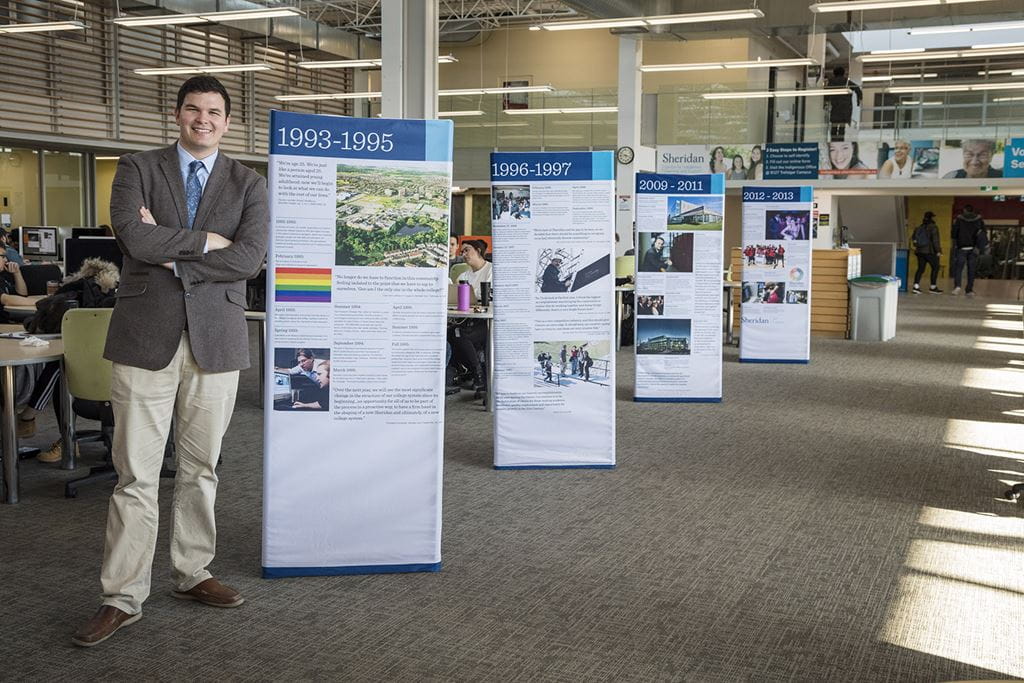
Making history come alive
 by Christine Szustaczek – Jan 26, 2018
by Christine Szustaczek – Jan 26, 2018 Dr. Peter Kikkert loves history. He was the kid who compulsively read children’s encyclopedias to absorb as many facts as he could and immersed himself in volumes of stories about the past. It’s probably not surprising then that his deep interest in humanity’s triumphs and failures has fueled a passion for teaching today’s generation about how history shapes our collective future.
“History is so much more than facts and dates,” explains Kikkert. “It’s alive, it surrounds us. It shapes us, guides us, shows us our mistakes, failures and successes. History is stories – some tragic, some beautiful, all meaningful.” Importantly, these historical stories have the power to create empathy. “Once we understand why people have done certain things, why events have unfolded in a certain way, or how historic events have affected different communities, groups and individuals, we can start to learn from the past and understand what we need to do to be better citizens and better human beings. A healthy and functional community is a historically literate community.”
One of the biggest insults to Kikkert is the assertion that history is boring. “As a historian, you get to be a detective every day,” he says. “We dig into archives, investigate past events and try to look at them in different ways. That’s what drew me to this field. There’s always more to learn and the potential that you might find something that others have overlooked. Journeys into the past can be very exciting.”
“History is so much more than facts and dates. It’s alive, it surrounds us. It shapes us, guides us, shows us our mistakes, failures and successes. History is stories – some tragic, some beautiful, all meaningful.” – Dr. Peter Kikkert
For the better part of 2017, Kikkert filled his free time by using his energy and talent to examine Sheridan’s creation and development. Together with his research assistant Justin Santiago, the pair examined public records to determine the major themes and events that have shaped Sheridan over the past five decades. From their material, eight panel displays were created to build a historical record that would live past Sheridan’s 50th anniversary celebrations.
“Understanding our history helps people to make sense of where we came from, how we’ve evolved and where we’re headed,” says Kikkert. “We can see the ideas that have been in our DNA from the beginning, the culture we’ve embraced, and how we’ve reflected societal norms and values over time. To understand history, you need to look at change and continuity,” he adds. “What are the things that have been here since the beginning and still matter? That’s what constitutes our foundation as a college. But you also need to look at where we’ve changed course, or faced obstacles and overcome them. Knowing where we’ve succeeded or failed is key to enable good decision making.”
On his list of highlights about Sheridan are the institution’s enduring commitment to creativity, teaching and learning, and community.
“Our work in creativity pops up everywhere from 1967 all the way to today,” he says. “This isn’t something we chose when we rebranded a few years ago. It’s been here all along, from the original President, and our early decision to adopt Visual Arts and a School of Crafts and Design, and later animation as our focal points. Today, we’re still talking about an Institute for Creative Studies and yet we had a Centre for Creativity Studies and a Creativity Festival to promote creative thought in the 80s.”
“There’s also our deep commitment to teaching and learning. From the very beginning, there’s been a continuous focus on improving the classroom experience. Our first President, Jack Porter, called on faculty to get away from the chalkboard, focus on being engaging and let students ‘get their hands in the dough’. Sheridan’s still doing that. We’re committed to giving students hands-on experience and practical training. You see it in every decade.”
“Our work in creativity pops up everywhere from 1967 all the way to today. This isn’t something we chose when we rebranded a few years ago. It’s been here all along.” – Dr. Peter Kikkert
“I also love the quotes from the 60s and 70s about community. Dean Hamilton said ‘community is the college’. I love that. We need to engage not just the Sheridan community but focus on the ways that we work with our partners in Halton and Peel. Bringing those stories to light helps to create a sense of shared identity, common purpose and belonging.” One of the best examples, according to Kikkert, is the Women’s Centre Sheridan established in 1975. “During its years in operation, the Centre acted as a resource for students, staff, faculty and the wider community and a safe space where women could organize and coordinate. It hosted events, put on a lecture series called Herizon, published the Women’s News, which soon had 4500 subscribers, and initiated a formal Status of Women at Sheridan report, the first community college to do so. The Centre had a profound impact on the wider community and gained acclaim across the province for its work in the struggle for women’s rights. That’s an amazing part of the college’s foundational years that I think needs to be remembered.”
“As much as I’m a historian, I really think of myself as storyteller,” concludes Kikkert. “Everyone loves stories. That’s why we binge watch Netflix. But history has the real stories that explain the world around us in a very tangible way. I’ll discuss history with anyone who will listen. The best learning comes when you inspire people to delve into the stories of their own past. That’s how you make history come alive and spark people’s enthusiasm to learn more.”
____________________________________________________________________________________
Pictured at top of page: Sheridan Professor of Public History Dr. Peter Kikkert. Photo by Owen Colborne.
Written by: Christine Szustaczek, Vice President, External Relations at Sheridan.
Media Contact
Meagan Kashty
Manager, Communications and Public Relations





